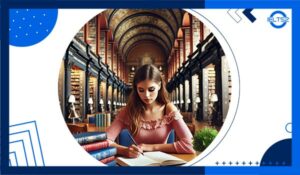نمونه سوالات اسپیکینگ آیلتس درباره علم (پارت 1 2 3)
در این بخش بیش از 20 نمونه سوال اسپیکینگ آیلتس نمره 9 از آخرین سوالات گزارش شده از سنترهای برگزار کننده آیلتس در ایران و خارج از کشور مربوط به پارت 1، 2 و 3 درباره موضوع “علم” را برای شما فهرست کرده ایم. در ادامه همچنین نکات گرامری، لغات و دلایل دریافت نمره 9 را توضیح داده ایم. 1000 نمونه سوالات اسپیکینگ آیلتس با جواب PDF پارت 1 2 3 پیشنهاد بعدی ما به شما عزیزان است.
نمونه سوالات اسپیکینگ آیلتس درباره موضوع علم (پارت 1)
IELTS Speaking Part 1 – Science
1. Do you like science?
Yes, I am very interested in science because it helps us understand the world around us and provides solutions to many problems. From physics to biology, every branch of science opens new doors to knowledge. I particularly enjoy learning about advancements in technology and medicine, as they have the potential to transform lives. Science also challenges our thinking, pushing the boundaries of what we know and inspiring new ideas and innovations.
2. What scientific discoveries do you find most interesting?
One of the most fascinating scientific discoveries for me is the theory of relativity by Einstein. The idea that space and time are interconnected, and that the fabric of space can bend around massive objects, completely changes how we understand the universe. Another exciting discovery is the development of CRISPR technology, which allows precise editing of DNA. This has enormous potential for curing genetic diseases and advancing personalized medicine.
3. Do you think science is important in our everyday lives?
Absolutely, science plays an essential role in our daily lives. From the smartphone in your pocket to the medical treatments that save lives, science is at the heart of modern society. It’s responsible for innovations in transportation, communication, and agriculture. Even household appliances, like refrigerators and washing machines, rely on scientific principles. Science has transformed the way we live and will continue to improve our quality of life.
4. How has science changed the world in recent years?
In recent years, science has led to significant changes in various fields. Advances in renewable energy technologies, like solar and wind power, have made a big impact on how we address climate change. Medical science has seen breakthroughs like mRNA vaccines, which have been pivotal in combating the COVID-19 pandemic. Additionally, space exploration has expanded our understanding of the universe, and artificial intelligence is revolutionizing industries like healthcare and finance.
5. What branch of science interests you the most?
I’m most interested in physics because it explains the fundamental forces of nature. From quantum mechanics to cosmology, physics explores everything from the tiniest particles to the largest galaxies. I find it fascinating how everything in the universe is governed by the same principles, and how scientists can predict the behavior of objects across vast distances. The concepts of relativity and quantum theory challenge our perceptions of reality, which makes studying physics even more exciting.
6. Do you think science is always accurate?
While science strives for accuracy, it is not always 100% precise. Scientific theories and discoveries are often based on the best available evidence, but new data can lead to revisions or even the complete overturning of previous ideas. For example, the concept of the atom was once considered indivisible, but we now know it is made up of smaller particles. Science evolves over time as our understanding deepens and as technology allows us to make more precise measurements.
7. Do you prefer reading about science in books or on the internet?
I prefer reading about science both in books and online, depending on the topic. Books often provide a more in-depth understanding and are great for exploring complex subjects in detail. However, the internet allows for quick access to the latest scientific discoveries and updates. Online resources, like scientific journals and educational videos, provide current and cutting-edge information that books might not cover immediately, making it a great supplement to traditional learning.
8. Have you ever participated in any scientific experiments?
Yes, I have participated in a few science experiments during school. One memorable experiment involved studying chemical reactions. We combined different substances and observed the changes that occurred. It was fascinating to see how substances could transform into entirely new compounds. Though these experiments were small-scale, they sparked a deeper interest in science and showed me how experimentation is essential to understanding scientific principles.
9. Do you think science can solve all of the world’s problems?
While science has the potential to solve many of the world’s problems, it cannot solve everything on its own. Science can help address issues like disease, climate change, and food security through technological advancements and research. However, many problems also involve social, political, and economic factors that require broader solutions. It’s important to combine scientific knowledge with effective policies and global cooperation to truly make a positive impact on the world.
10. How do you think scientific knowledge can help future generations?
Scientific knowledge can greatly benefit future generations by providing solutions to ongoing challenges like climate change, energy sustainability, and disease prevention. For example, advancements in renewable energy technologies could help mitigate global warming, while new medical breakthroughs could extend lifespans and improve health. By continuing to prioritize scientific research, we can create a future where problems like food shortages and environmental degradation are minimized, ensuring a higher quality of life for future generations.
نمونه سوالات اسپیکینگ آیلتس درباره موضوع علم (پارت 2)
IELTS Speaking Part 2 – Science
Describe a scientific discovery that you think is important. You should say:
- What the discovery was
- When it was made
- How it changed the world
- Why it is important to you
One of the most important scientific discoveries, in my opinion, is the theory of relativity, formulated by Albert Einstein in the early 20th century. This groundbreaking discovery fundamentally altered our understanding of space, time, and gravity. Einstein’s theory, which includes both the special and general relativity, introduced the idea that time and space are not fixed and absolute, but rather they are flexible and affected by gravity and velocity.
The special theory of relativity, published in 1905, showed that the speed of light is constant, and nothing can travel faster than it. The general theory, published in 1915, further explained that massive objects like planets and stars warp the fabric of space-time, influencing the path of light and even time itself. This idea was a complete departure from the Newtonian view, which considered space and time as separate and unchanging.
Relativity changed the world by reshaping modern physics and providing a framework for understanding the universe on both the largest and smallest scales. It led to the development of technologies like GPS, which relies on adjustments based on relativistic effects.
To me, this discovery is significant because it challenges our fundamental perceptions of reality. It shows that there is always more to understand beyond the apparent laws of nature. The theory of relativity not only expanded our scientific knowledge but also inspired curiosity and the pursuit of further breakthroughs, making it one of the most profound contributions to science.

نمونه سوالات اسپیکینگ آیلتس درباره موضوع علم (پارت 3)
IELTS Speaking Part 3 – Science
1. Why do some people believe that science can be dangerous?
Some people believe that science can be dangerous because it has the potential to be misused. For example, advancements in nuclear energy or genetic engineering could have harmful consequences if not carefully regulated. In some cases, scientific discoveries have been used for destructive purposes, such as in the creation of nuclear weapons. Additionally, rapid technological advancements can lead to ethical concerns, like the manipulation of human genetics. While science itself is neutral, how we use it determines its impact.
2. Do you think science can be biased?
Yes, science can be biased in certain situations, especially when it comes to funding or research interests. For example, certain industries might fund studies that align with their economic goals, leading to biased results. There can also be cultural or personal biases that influence the direction of research. However, the scientific method is designed to minimize bias by emphasizing evidence, peer review, and repeatability. Despite this, bias can still creep in, and it’s important to be aware of these potential influences.
3. How do you think science education could be improved?
I think science education could be improved by making it more interactive and hands-on. Instead of relying solely on textbooks, students should engage in experiments and real-world applications of scientific principles. Additionally, incorporating more technology into the classroom, such as simulations and virtual labs, can help make complex concepts more accessible. Encouraging curiosity and critical thinking should also be emphasized, as this will inspire students to ask questions and seek deeper understanding beyond the classroom.
4. How can science help in solving environmental issues?
Science plays a crucial role in addressing environmental issues by providing solutions for sustainable energy, pollution reduction, and climate change mitigation. Renewable energy technologies, like solar and wind power, offer alternatives to fossil fuels, helping to reduce greenhouse gas emissions. Scientists also develop innovative ways to clean up polluted environments, such as biodegradable plastics and carbon capture technologies. By studying ecosystems and the effects of human activity, science helps us understand how to protect and preserve the planet for future generations.
5. What role does science play in healthcare?
Science is at the heart of modern healthcare, driving innovations in diagnostics, treatments, and prevention. Medical research has led to the development of vaccines, antibiotics, and cutting-edge therapies that have saved millions of lives. Moreover, advancements in genetics, like gene therapy, are opening new possibilities for treating inherited diseases. The use of technology, such as medical imaging and robotic surgery, has also revolutionized the way doctors diagnose and treat conditions, improving patient outcomes significantly.
6. Do you think science will be able to solve the problem of aging?
While science has made significant strides in understanding the aging process, solving the problem of aging is still far off. Research in areas like regenerative medicine and genetic engineering holds promise for slowing down the aging process and potentially extending lifespan. However, aging is a complex biological phenomenon that involves genetic, environmental, and lifestyle factors. While science may one day help us live longer, it is unlikely to completely eliminate aging, as it is an inevitable part of life.
7. How do you think science affects human relationships?
Science has both positive and negative effects on human relationships. On the positive side, advances in communication technology, such as social media and video calls, allow people to stay connected regardless of distance. On the negative side, technology can sometimes lead to social isolation, as people spend more time online and less time interacting face-to-face. Additionally, scientific advancements in fields like artificial intelligence and robotics may reshape the nature of human relationships, creating both opportunities and challenges.
8. Do you think people trust science enough?
In general, people tend to trust science because it is based on evidence and logical reasoning. However, there are instances where skepticism arises, especially when scientific findings conflict with personal beliefs or political views. For example, some people may question climate change science or vaccination research due to misinformation or ideological biases. It’s important to promote scientific literacy and encourage people to critically evaluate scientific information from credible sources in order to build trust in science.
9. How does science impact the economy?
Science has a profound impact on the economy by driving innovation and creating new industries. Breakthroughs in fields like biotechnology, renewable energy, and information technology have led to the development of new products and services, which generate economic growth. Moreover, scientific advancements improve productivity and efficiency in existing industries, reducing costs and increasing profits. The development of new technologies also creates jobs and attracts investment, contributing to the overall health of the economy.
10. What ethical issues do you think science faces?
Science faces several ethical issues, particularly in areas like genetic engineering, cloning, and artificial intelligence. For example, the ability to manipulate genes raises concerns about the potential for “designer babies” or unintended consequences. Cloning and stem cell research also raise ethical questions about the value of life and the limits of scientific intervention. As technology advances, it’s crucial for scientists and policymakers to consider the ethical implications of their work and ensure that science is used responsibly.
تاثیر گرامر و لغت در سمپل های بالا برای رسیدن به نمره 9
- دقت گرامری: پاسخها از جملات پیچیده با حداقل اشتباهات استفاده میکنند، مانند جملات شرطی، جملات وابسته و ساختارهای مجهول. جملات همچنین از نظر طول و ساختار متنوع هستند که این امر یکی از عوامل کلیدی برای رسیدن به نمره 9 است. هیچگونه اشتباه گرامری قابل توجهی که مانع برقراری ارتباط شود وجود ندارد.
- منابع لغوی: واژگان استفادهشده متنوع و مربوط به موضوع هستند، مانند اصطلاحاتی چون “پزشکی بازساختی”، “مهندسی ژنتیک”، “انرژی پایدار” و “آگاهی علمی”. پاسخها همچنین از زبان رسمی و مناسب برای بحثهای آکادمیک و فکری استفاده میکنند و از دامنه گستردهای از عبارات برای نشان دادن تسلط بالای لغوی بهره میبرند.
- انسجام و پیوستگی: پاسخها بهخوبی سازماندهیشدهاند و جملات موضوعی واضح و توسعه منطقی دارند. از عبارات انتقالی مانند “برای مثال”، “علاوه بر این” و “با این حال” برای هدایت خواننده در طول پاسخ استفاده میشود که اطمینان میدهد ارتباط بین ایدهها بهطور روان و منطقی حفظ شود.
- روانی: پاسخها بهطور طبیعی و بدون وقفه جریان دارند و ایدهها به شکلی منظم و منطقی ارائه شدهاند. هیچگونه تردید یا تکراری وجود ندارد و گوینده قادر است ایدهها را بهطور واضح و با اعتماد به نفس بیان کند.
- پاسخ به تکلیف: پاسخها بهطور کامل و دقیق به تمام بخشهای سوال پاسخ میدهند و توضیحات و مثالهای جزئی ارائه میکنند. این پاسخها بهطور کامل توسعهیافتهاند و درک دقیقی از موضوع را ارائه میدهند که باعث میشود پاسخها با معیارهای نمره 9 هماهنگ شوند.
تعیین سطح رایگان اسپیکینگ ❤️
نمونه سوالات اسپیکینگ آیلتس درباره موضوع علم پارت 1 2 3 را به همراه سمپل های نمره 9 آن ها با هم دیدیم. در ادامه نمونه سوالات دسته بندی شده اسپیکینگ آیلتس پیشنهاد آخر ما به دوستان گرامی هست. این نمونه سوالات اسپکینگ از پرتکرار ترین تاپیک های این بخش و همچنین جدیدترین موضوعات می باشند. این مجموعه توسط یکی از سایت های معتبر و فعال آیلتس تنظیم شده است. همچنین برای تعیین سطح و تعیین رایگان نمره اسپیکینگ و دریافت جدید ترین سمپل های نمره 9 در کانال تلگرام اسپیکینگ ما همراه باشید و به ادمین برای تعیین نمره اطلاع دهید.






